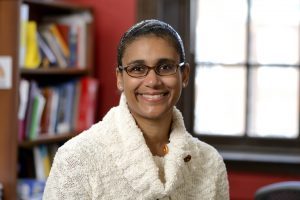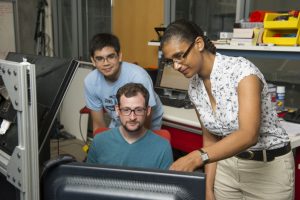Gayme Wins ONR Award for Work on Wall-Bounded Turbulent Flows
 LCSR’s Dennice Gayme, Carol Croft Linde Faculty Scholar and assistant professor in the Department of Mechanical Engineering, has won the Office of Naval Research’s 2017 Young Investigator Program award for her work in the hydrodynamics of naval applications. This prestigious award supports researchers whose scientific pursuits show promise for supporting the Navy and Marine Corps and also promotes winners’ careers and professional development.
LCSR’s Dennice Gayme, Carol Croft Linde Faculty Scholar and assistant professor in the Department of Mechanical Engineering, has won the Office of Naval Research’s 2017 Young Investigator Program award for her work in the hydrodynamics of naval applications. This prestigious award supports researchers whose scientific pursuits show promise for supporting the Navy and Marine Corps and also promotes winners’ careers and professional development.
Gayme was recognized for her research which uses reduced order models to investigate how changes to ship surfaces affect transport efficiency.
She will use simplified mathematical model to perform systematic studies of how changes to the ship surface, e.g. the ship hull, affect drag. The goal is to reduce so-called “skin friction drag” – the force resisting the motion of a ship in the water – in order to identify which designs enable the ship to move more quickly and smoothly, reducing fuel costs. By changing surface characteristics, a researcher can manipulate how much friction drag exists and reducing the friction on the surface reduces drag.
“If you reduce skin friction drag, you have better fuel economy; things move through more efficiently, and even a one percent difference can cause a great deal of savings in fuel,” Gayme said.
Gayme plans to also use these models to  augment existing flow simulation tools that include models for small scale dynamics.
augment existing flow simulation tools that include models for small scale dynamics.
Through high fidelity simulations and detailed tests of reduced-order models, Gayme’s lab is developing a framework to more quickly test new simulation tools for turbulent flow against the surface of the ship.
The purpose of this research is to be able to do tests more quickly, saving money that would otherwise be spent on extremely detailed simulations.
“Just being able to understand which designs are promising to do further research on is very useful, because running an experiment with hundreds of different surfaces would be extremely cost intensive. Identifying which configurations are actually promising can reduce how much cost you spend on experiments with high-fidelity simulations,” Gayme said.
Gayme expects her research to result in a collection of tools that can be used to efficiently test new flow manipulation strategies and to isolate flow phenomena based on changes to naval vessel surfaces.
Creating these tools will allow researchers to do more cost-effective and efficient testing and also enable them to create new designs that help reduce drag, making the naval vessels more efficient and economical.


